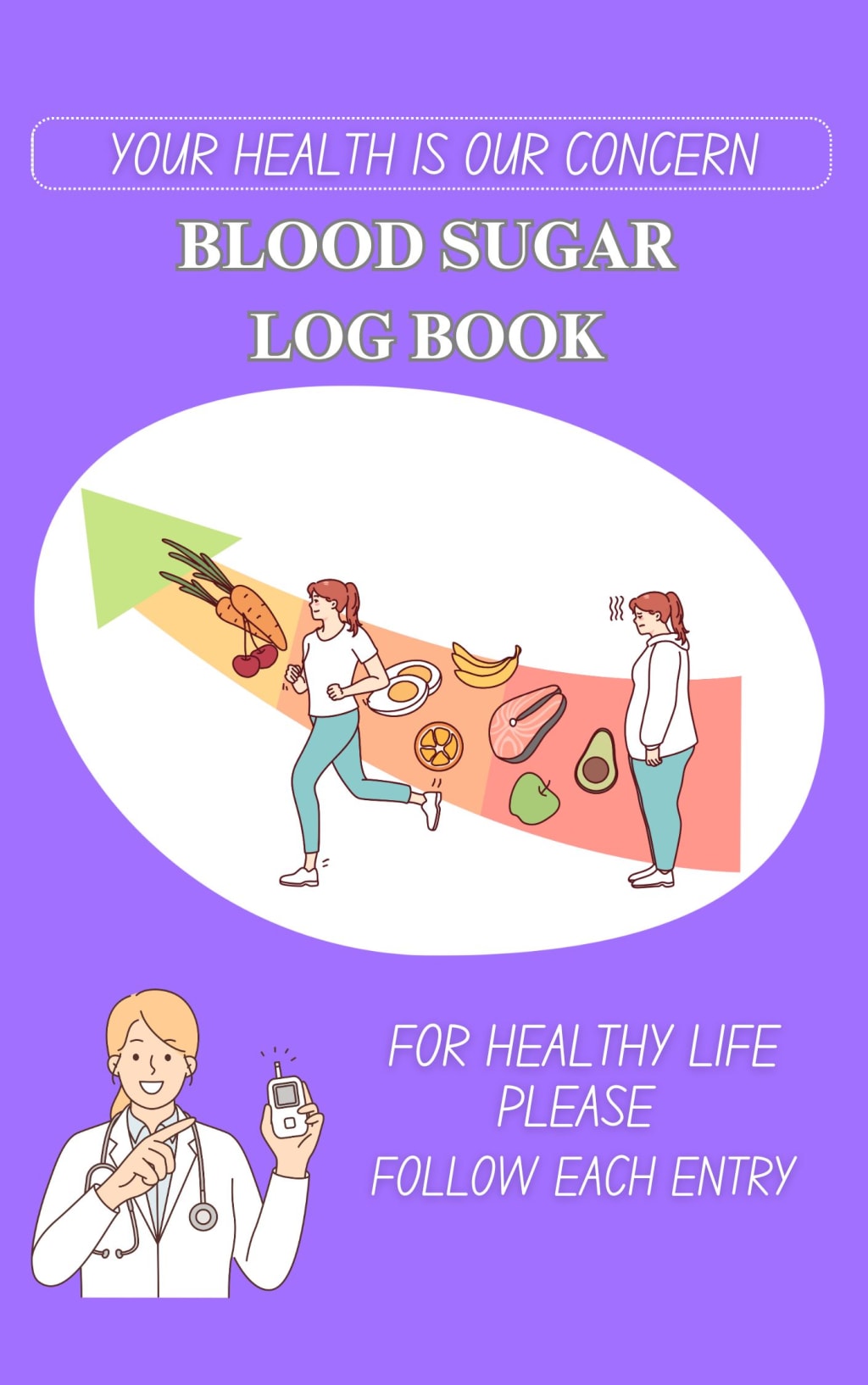Diabetes Management
Diabetes (Healthy eating Plan + Blood Sugar Tracking)

Diabetes management:
1-Creating a healthy eating plan that is right for you
A diabetic diet is a program for following a healthy eating pattern that helps control blood sugar levels. Use these tips for dieting, from meal planning to carb counting.
A diabetic diet simply means eating healthy, nutritious foods in moderate amounts and sticking to a consistent meal schedule. It is a plan that includes healthy food that is rich in natural nutrients and low in fat and calories. The main components of this diet are fruits, vegetables and whole grains. In fact, this type of diet is best for most people.
Why do you need to create a healthy eating plan?
If you have diabetes or prediabetes, your doctor will likely recommend that you see a dietitian to help you create a healthy eating plan. The plan helps you control your blood sugar, also known as blood glucose, as well as weight and heart disease risk factors. These factors include high blood pressure and high blood fats.
When you eat more calories and carbohydrates than your body needs, your blood sugar levels rise. If you don't control your blood sugar, it can lead to serious problems. These problems include high blood sugar, called hyperglycemia. If high blood sugar levels persist for a long time, this may lead to complications, such as damage to the nerves, kidneys, and heart.
You can keep your blood sugar levels in a safe range. Make sure to eat healthy food and monitor your eating habits.
For most people with type 2 diabetes, losing weight can also help control blood sugar. Weight loss can bring a host of other health benefits. If you need to lose weight, following a healthy eating plan allows you to reach your goal safely, in an organized and nutritious way.
What does a diet mean for people with diabetes?
The diet for people with diabetes depends on eating healthy meals at regular times. Eating meals at regular times helps in effectively consuming the insulin secreted by the body or taken by the patient in the form of medication.
A registered dietitian can also help you develop a diet based on your health goals, personal preferences and lifestyle. He or she can also discuss with you how to improve your eating habits. Among the options available to you is choosing the size of food portions that suit your body size and activity level.
Recommended foods
Eat nutrient-dense foods that fit your caloric intake. Choose healthy carbohydrates, high-fiber foods, fish, and “good” fats.
Healthy carbohydrates
Sugars and starches break down during digestion into glucose in the blood. Sugars are also known as simple carbohydrates, while starches are known as complex carbohydrates. Focus on eating healthy carbohydrates, such as:
the fruit.
Vegetables.
Whole grains:
Legumes such as beans and peas.
Low-fat dairy products, such as milk and cheese.
Avoid low-nutrient carbohydrates, such as foods or drinks with added fats, sugars and sodium.
Foods rich in fiber
Dietary fiber includes all components of plant foods that the body cannot digest or absorb. Fiber modifies the way your body digests food and helps control blood sugar levels. Foods rich in fiber include:
Vegetables.
the fruit.
Nuts.
Legumes such as beans and peas.
Whole grains:
Fish are beneficial for heart health.
Eat healthy fish that is beneficial for heart health at least twice a week. Fish, such as salmon, mackerel, tuna and sardines, are rich in omega-3 fatty acids. Omega-3 fatty acids may protect against heart disease.
Avoid eating fried fish and fish that contain high levels of mercury, such as cod.
“Good” fats
Foods containing monounsaturated fats and polyunsaturated fats can help lower blood cholesterol levels. It includes:
Avocado fruits.
Nuts.
Canola oils, olive oil, and peanut oil.
But do not overdo it, as all fats are rich in calories.
Which should be avoided
Diabetes may cause clogged and hardened arteries, making fewer people suffer from heart disease and stroke. Foods that contain the following elements can harm your health permanently and are beneficial for the heart.
Saturated capacity. Avoid cheese derivatives and processed proteins, such as butter, beef, sausages, hot dogs, and bacon. Also reduce your intake of coconut and palm seed oils.
Transforming achievement. Avoid the shifting tactics that range between running and baked goods, accompanied by shortening (whisk able) and toxic farmers (hard margarine).
Cholesterol. Sources of cholesterol include fatty dairy products, fatty animal proteins, egg yolks, liver, and other offal meats. Don't eat more than 200 mg of cholesterol per day.
Sodium. Don't eat more than 2,300 mg of sodium per day. Your doctor may suggest eating a smaller amount if you have high blood pressure.
You can follow a few different ways to determine a healthy diet to help you keep your blood sugar level within the normal range. With the help of a dietitian, you may find one or more of the following methods to work for you:
Adhering to a healthy eating plan is the best way to maintain blood sugar control and avoid diabetes complications. If you need to lose weight, you can modify this plan to suit your own goals.
Besides controlling diabetes, a healthy diet offers other advantages as well. Because this diet recommends eating large amounts of fruits, vegetables, and fiber, following it will likely reduce your risk of cardiovascular disease and certain types of cancer. Eating low-fat dairy products can also reduce the risk of low bone mass.
2-Blood Sugar Level Tracking
Maintaining optimal health involves various facets, one of which is monitoring blood sugar levels. Whether you’re managing diabetes or striving for overall wellness, tracking your blood sugar levels is essential. Let's delve into why it's crucial and how it can positively impact your health.
1. Diabetes Management:
For individuals with diabetes, consistent blood sugar monitoring is paramount. Fluctuations in blood glucose levels can lead to severe complications such as heart disease, kidney damage, and nerve damage. By tracking blood sugar levels regularly, diabetics can adjust their diet, exercise, and medication to maintain stable levels and prevent these complications.
2. Early Detection of Health Issues:
Monitoring blood sugar levels can serve as an early warning system for various health issues beyond diabetes. Persistent high blood sugar levels may indicate insulin resistance, which can progress to type 2 diabetes if left unchecked. On the other hand, consistently low blood sugar levels may signal hypoglycemia, which can cause dizziness, confusion, and even loss of consciousness if severe.
3. Customized Treatment Plans:
Every individual's response to food, medication, and lifestyle factors differs. Tracking blood sugar levels helps healthcare providers tailor treatment plans according to individual needs. By analyzing trends over time, doctors can make informed decisions about medication adjustments, dietary modifications, and lifestyle changes to optimize blood sugar control.
4. Preventing Complications:
Uncontrolled blood sugar levels can have serious consequences, including nerve damage, vision problems, and cardiovascular disease. Regular monitoring allows individuals to detect and address fluctuations promptly, reducing the risk of complications associated with diabetes and other conditions influenced by blood sugar levels.
5. Empowering Self-Management:
Monitoring blood sugar levels empowers individuals to take charge of their health. By understanding how their dietary choices, physical activity, stress levels, and medication impact blood sugar levels, individuals can make informed decisions to maintain stability and prevent complications.
6. Improved Quality of Life:
Stable blood sugar levels contribute to overall well-being and quality of life. When blood sugar levels are within the target range, individuals experience fewer symptoms such as fatigue, thirst, and frequent urination, allowing them to engage fully in daily activities and enjoy a higher quality of life.
7. Facilitating Communication with Healthcare Providers:
Regular blood sugar monitoring provides valuable data for healthcare providers, facilitating more productive discussions during appointments. By sharing blood sugar logs with their doctors, patients can receive personalized guidance and support to optimize their management plan and achieve better health outcomes.
Conclusion:
Tracking blood sugar levels is not just a routine task; it's a vital component of managing diabetes and promoting overall health and well-being. Whether you're living with diabetes or aiming to prevent it, monitoring your blood sugar levels empowers you to make informed decisions, prevent complications, and live a healthier, more fulfilling life. Make blood sugar monitoring a priority, and partner with your healthcare team to optimize your health journey.
you can get Blood Sugar Log Book 110 page for 2.5$ only from here
About the Creator
Enjoyed the story? Support the Creator.
Subscribe for free to receive all their stories in your feed. You could also pledge your support or give them a one-off tip, letting them know you appreciate their work.






Comments
There are no comments for this story
Be the first to respond and start the conversation.